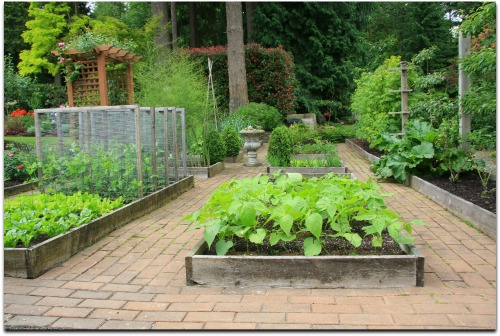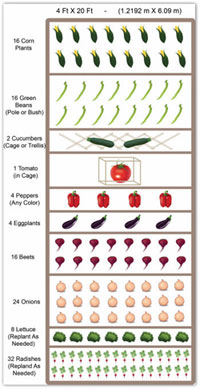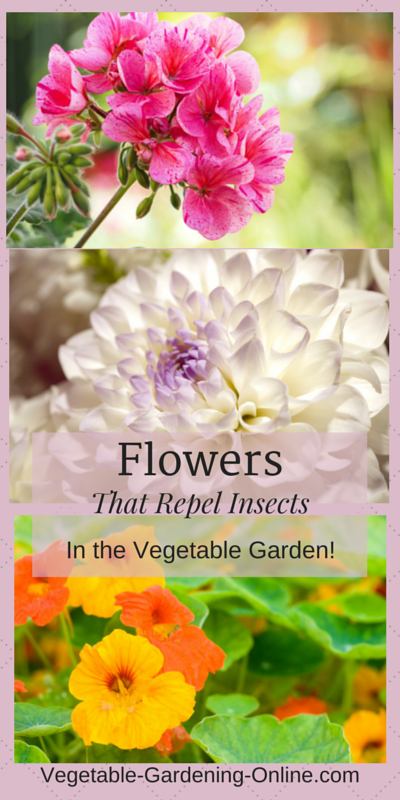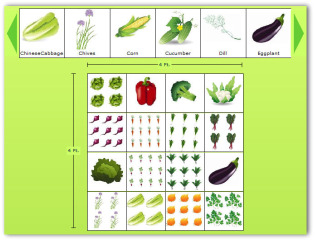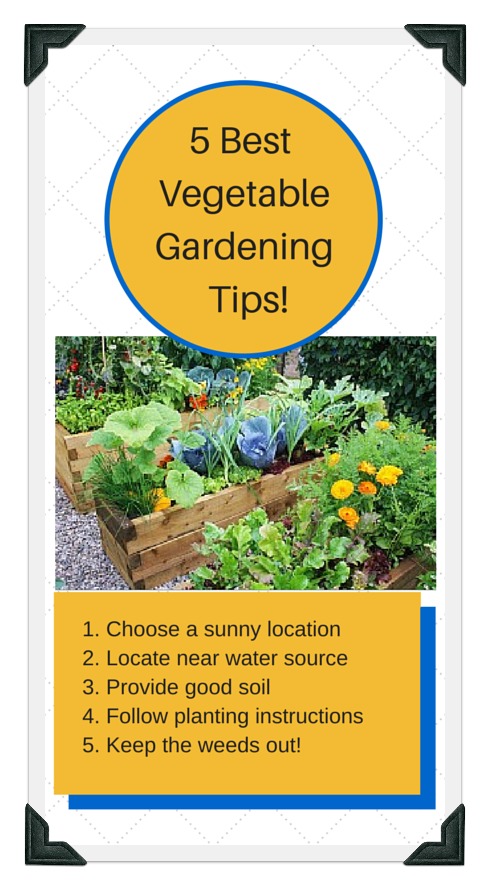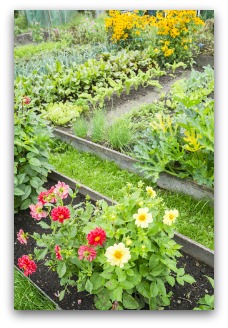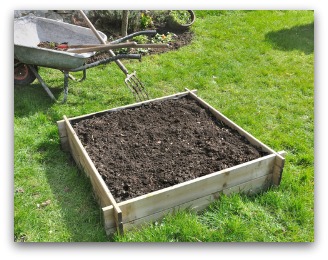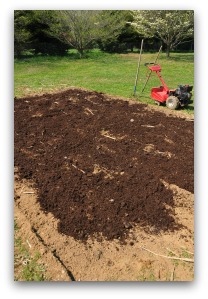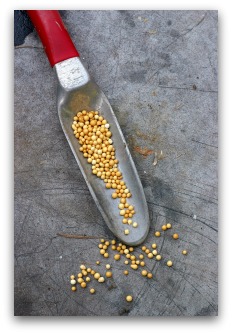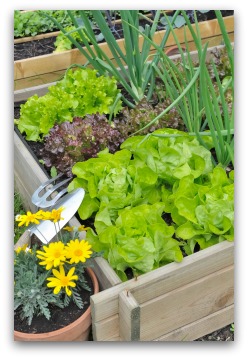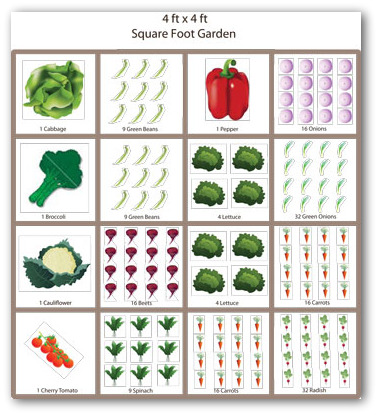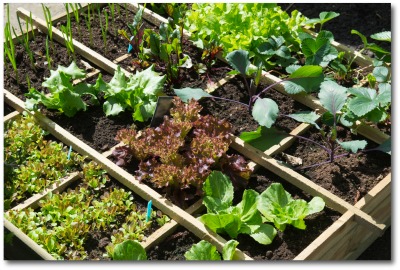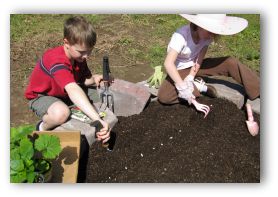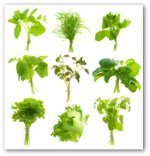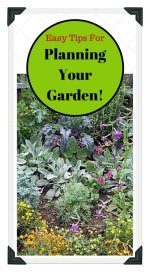Raised Bed
Vegetable Garden Layout Ideas
Use our free raised bed vegetable garden plans and worksheets by clicking on this link.
Follow our easy steps and plans to build a small home vegetable garden that suits your available size and location!
Why not design a vegetable garden that can be an attractive part of your landscape?
It is a simple and easy project that can easily be accomplished in one weekend with the help of a few garden tool supplies.
Visit your nearest gardeners supply or garden supply company to find the materials you will need to build a convenient, easy-to-plant and tend raised garden bed today!
Raised bed gardens make planning and planting a vegetable garden a much easier chore, and weeding becomes a breeze.
See our raised bed garden video as proof!
Add a few colorful marigolds, geraniums, nasturtiums, dahlias, petunias, or chrysanthemums to your garden, and you not only repel insects from your garden, but create a beautiful and colorful focal point to your landscape!
Download Free Garden Planning Worksheets, Garden Diary, Zone Chart, Or Planting Guide
Design Your Own Raised Bed Garden Using our Online Planner
Raised bed gardens can also be created on a patio when provisions are made for drainage.
Raised bed vegetable gardens are an easy way to plan and design a small beginner vegetable garden that will provide a good amount of fresh, flavorful,and delicious veggies for your family to enjoy.
5 Best Tips for
Raised Bed Gardening Success!
Lots of Raised Bed Vegetable Garden Ideas...

This short video gives lots of great raised bed garden design ideas...from wood 2 by 6 frames, to posts and cement landscape pavers.
Building a Raised Bed
Vegetable Garden
Saturday Project with the Grandkids

* Part of the fun of gardening is watching the progression of bloom to harvest.
* Crops crowded in the backyard that are inconvenient to cultivate are often left unattended.
Once the initial effort is made to create a raised bed vegetable garden, planting and tending your garden is much easier thereafter than with a traditional in-ground garden!
* Harvests and pest problems won’t be missed if a raised bed vegetable garden is planted in the front yard, near the porch, patio, or walkways.
Raised Bed Gardens are Easy to Plant and Maintain
* Raised bed gardens are a creative way to organize a successful garden design and keep the maintenance simple.
* The technique puts crops in full view, easy to reach, and ensures good drainage for the plants.
* The raised bed vegetable garden can be expanded to any length but a four foot width makes it convenient to tend the bed from the sides. (This way the soil is not compacted from being walked on!)
* Gardeners can sit on the sides of a raised garden bed to do the planting and weeding.
* Raised beds can also be elevated on legs to make the gardens wheel chair accessible. The beds give a tidy appearance to the landscape.
* By keeping the plants off the ground, and gardeners off the soil, there is less dirt on your shoes to be tracked through the house!
How to Build or Create a Raised Bed Vegetable Garden
A raised bed can be created by simply mounding six to 12 inches of soil on top of existing ground, raking the top flat, and sloping the edges downward.
* For best results however, it is a good idea to use boards, bricks, or building stones to form the edges of your garden.
* If you want your raised bed garden to be an attractive part of your landscape, choose attractive materials for the edging that will compliment your patio or flower bed borders.
* Your raised bed garden can easily be so attractive that it can be a focal point in your front, side, or backyard landscape!
Easy Steps for Building
a Raised Bed Garden
Step 1. Choose location (north to south) and clear existing vegetation unless you want to cover it with landscape fabric, or layers of newspaper during step three.
Ideally a raised bed garden should be no more than four feet wide.
Any length is fine that works in your location is fine.
Step 2. Use string and stakes to create outline of garden edges.
Four feet is the recommended maximum width for the garden.
It is not necessary to include the border material in the four foot measurement, if you use wider material such as bricks or stones that you can sit on while working in your garden.
Step 3. Build the edges for your raised bed garden with either wood, bricks, or decorative stones.
Do not use pressure treated wood in your vegetable garden, as the chemicals can leach into the soil and also your vegetables!
Cover the ground in the bottom of your garden with landscape fabric or a thick layer of newspapers. (This will help keep weeds from growing up through your garden from below.)
Step 4. Fill your garden with garden soil mixture to about 3 inches below the top of your edging material.
Do not over-fill with soil, as you do not want water to run off the top of your garden and over the edges.
Rake and smooth the top of the soil.
Step 5. Water the soil thoroughly before planting your raised bed vegetable garden.
If the soil settles a lot, add soil as needed being careful to leave the soil 2 to 3 inches below the top of your garden.
What Type of Soil is Best?
Any good-quality garden soil can be added to a raised bed vegetable garden.
Soil can be improved immensely with a liberal addition of organic matter such as well-aged manure, peat moss and compost.
How to Amend Your Soil
* Equal parts of perlite, sphagnum, compost, and peat moss make a light loose substitute for raised bed soil.
* To adjust the acidity for most crops, add two pounds of dolomitic lime for every hundred square feet of bed to the mix.
* The lime can be worked in right before planting but is better incorporated a week or two earlier to get a head start on adjusting the acidity.
Hint: Local companies often offer special "garden soil mixes" which already contain all of the ideal ingredients for growing a vegetable garden.
Your garden soil can be delivered right to your doorstep, or to save money you can have it loaded into your own vehicle.
Adding Fertilizer
Fertilizer can be added at planting time, at a rate of one pound of 6-6-6 to each 100 square feet of raised garden bed.
Or you can add organic liquid fish fertilizer every 2-3 weeks during the growing season.
Some soils are of such poor condition or rocky that they present a cultural problem requiring special gardening techniques.
This is a situation made to order for vegetable gardening in raised beds.
Where to Locate?
Most important is to choose a sunny location when planning a vegetable garden of any type!
When planning a raised bed vegetable garden, locate your garden running from north to south for ideal growing conditions for your plants.
* Plant the tallest vegetables on the north end of the garden.
* Plant medium height vegetables in the center.
* Plant shorter vegetables in the south end of the garden.
Fill the entire bed with vegetables, as there is no need to leave space for walking!
Plant quick growing vegetables such as lettuce, green onions and radishes to fill in areas that won't be used for a while by slower growing plants such as green beans, peppers, or cucumbers.
Use a cage or trellis to support and train larger growing plants such as green beans, tomatoes and cucumbers upwards so that they don't take up so much space in your garden.
Square Foot Raised Bed Garden Design
Click Here for a Free Square-Foot Garden Plan
Successful raised bed gardeners direct their first efforts not to the break backing work of tilling the land, but planning and planting their gardens!
Organize the areas that can be planted and then select the crops you wish to grow.
Sketch out on paper, the location of where you want the raised bed garden to be located and the desired placement of your vegetables.
As your garden space is limited, be sure to choose your favorite vegetables to plant in your garden.
Growing a tomato plant or two is always a good idea, as even one plant will provide 20 to 50 pounds of delicious vine-ripened tomatoes!
Hint: At the end of each growing season, cover the top of your raised bed vegetable garden with compost or other material that can work its way into the soil during the winter months.
This will help your garden soil continue to be rich and fertile for next garden season!
A Great Family Project!
So have some fun with creating your raised vegetable garden plan and design.
It is a great project that the whole family can enjoy together.
Growing vegetables is a life-skill that is important for everyone to have.
Kids who help their parents garden are often more inclined to eat the vegetables that come from their home garden!
Allow your child to choose one or two plants to add to the garden that they can tend and harvest themselves.
Soon your whole family will be experienced gardeners!
If you are interested in a book about organic vegetable gardening, click here.
You Might Also like to Read:
Building a Raised Vegetable Garden
